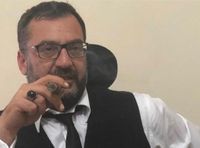In a significant development reflecting the turbulent intersection of politics and media in Turkey, news regarding Serdar Haydanlı, the owner of the '4,5G' company, has been mysteriously removed from several pro-government media outlets. Haydanlı was detained as part of an investigation involving Istanbul Metropolitan Municipality (İBB) President Ekrem İmamoğlu, who has been accused of leading a criminal organization. Initially, outlets such as Sabah and A Haber labeled Haydanlı as a key figure in the ongoing investigation, describing him as 'the perception operator for İBB.'
However, just days after these reports were published, they vanished. Hyperlinks to articles that previously featured headlines like 'Who is Serdar Haydanlı?' and 'İBB’s perception operations' are no longer accessible, raising eyebrows about the degree of media control exercised in the country. Further, news content highlighting an Instagram post by Haydanlı which featured a photo of President Recep Tayyip Erdoğan alongside the caption, 'Ours is a love story,' has also been deleted.
CHP (Republican People's Party) leader Özgür Özel took to the press on March 22, 2025, following Haydanlı's detention, to criticize the circumstances surrounding his release. Özel alleged that Haydanlı was set free due to his close associations with the AK Party. He claimed, 'A phone call was made, and he was released without any proper proceedings.' This claim, however, was later denied by the Istanbul Chief Public Prosecutor's Office.
During his press conference at the İBB building in Saraçhane, Özel highlighted that the news outlets, including A Haber, Sabah, and TRT, which originally reported on Haydanlı’s case, took down their articles shortly after their publication. He stated, 'It is no coincidence that pro-government channels are engaged in perception management regarding this operation.' Özel remarked on the implications this has for media freedom in Turkey, insisting that the public deserves transparency regarding all dealings of the government and connected individuals.
According to reports, Serdar Haydanlı began working with the İBB in 2015, with contracts concluding in 2021. He is known in the telecommunications and technology sector for founding the '4,5G Group'. His involvement with public enterprises includes organizing events such as Teknofest, which is under the aegis of the Turkish presidency’s communications office.
Moreover, in the Medya AŞ investigation, a secret witness named 'Meşe' claimed that a network allowed companies obtaining tenders from İBB to issue fake invoices. The witness alluded that funds generated from this illegal activity were used to finance political operations, which included supporting campaigns for Ekrem İmamoğlu during elections by financing promotional materials and providing 'pocket money' to citizens to influence their votes.
This alarming situation reflects ongoing tensions in the Turkish political landscape, notably the growing scrutiny of media practices that support the ruling party while suppressing dissenting narratives. Özel explained, 'The media is called to account for the 70% of the audience who are our supporters. You must be fair or face the consequences as you will have a longer memory regarding these inconsistencies.'
As the Istanbul Chief Public Prosecutor's Office confirmed that Haydanlı was in custody and set to be taken to court alongside other suspects, it marks a pivotal moment for the future of media and political integrity in Turkey. The handling of Haydanlı's case is indicative of broader issues of censorship, where critical reports disappear in the face of political pressure.
The narrative spurring around Serdar Haydanlı illustrates the delicate balance of governance and journalism in Turkey, raising questions about accountability and ethical reporting. As the investigation unfolds, the implications of media silencing will likely continue to resonate in public discourse and shape political dynamics in the country.


